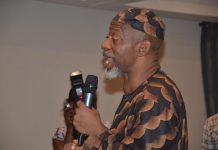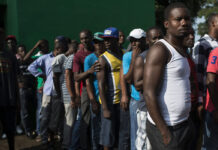Ladi Kodi can earn just 1,000 naira ($2.70, 2.5 euros) a week selling medicinal “black soap” in her home state of Nasarawa, in north central Nigeria.
The money — barely the price of a takeaway coffee in many countries isn’t enough for the 45-year-old widow to care for her five children.
But for the past year she’s been one of 300,000 people receiving twice-monthly payments from a landmark government welfare scheme.
Business has improved and on good weeks, Kodi can now earn 2,000 naira from her self-financed operation.
“Before, I was borrowing money to produce it,” she told AFP as she scooped lumps of the coal-like substance from a pot of boiling water on to plastic sheets to cool.
Kodi and more than 1,400 other people in and around the town of Garaku – most of them subsistence farmers and traders – are enrolled in the Conditional Cash Transfer (CCT) scheme.
The scheme, billed as Nigeria’s largest welfare payment programme when it began in early 2017, aimed to give one million people 5,000 naira a month, and five million by 2021.
Two years on, there are just more than 300,000 recipients in 27 of 36 states getting 10,000 naira every other month.
Most recipients are women who are encouraged to set up community saving schemes, and receive advice on how to make the money go further.
Smaller versions of cash welfare payments existed before President Muhammadu Buhari came to power in 2015.
But his government has launched a series of initiatives and interest-free loans it boasts will significantly reduce poverty and improve living standards.
The CCT is partly funded by more than $321 million of public money stolen and stashed overseas by former military ruler Sani Abacha, and the World Bank has granted it a $500 million loan.
Henry Ayede, from the National Cash Transfer Office, said the aim was “to reach the doorstep of ordinary Nigerians”.
“We are doing that but it has had challenges,” he acknowledged.
Identifying and actually reaching eligible Nigerians is hard in a country with unreliable, outdated census data and no single registry of citizens.
Another challenge has been determining who is eligible.
About half of Nigeria’s 190 million people live in rural areas, and many lack formal identification such as passports or driving licences.
Binta Muhammed, a programme coordinator in Garaku, said that initially, rigid criteria excluded many potential recipients.
“Do you have a bike? Do you have a radio? Do you have a phone? These were some of the questions people were asked to determine if they were poor,” she said.
“Once you had a radio or a fan in your room, it disqualified you.”
The involvement of local leaders who know the community and can vet potential recipients has overcome that hurdle, she said, though allegations of favouritism have surfaced as well.
The government concedes the CCT criteria are arbitrary but insists there is no other way of running it.
“Everything is audited, checked and accounted for,” said Ayede. “It is a completely transparent process.”
Identifying recipients in “off-grid” rural pockets of Nigeria has helped build a ‘National Social Register” of poor and vulnerable people, he added.
“Now we have more credible information about the poor and can work out how to help them,” he said.
Garaku is a stark example of how hard it is for many to scrape by in Nigeria, which is recovering from recession caused by a slump in global oil prices.
A partially constructed local private primary school, for example, charges fees of less than 10,000 naira a year per child.
Kodi said she couldn’t afford to send two of her children until she received the welfare payments.
How far such programmes address Nigeria’s challenges has been hotly contested however, with inflation still in double digits and an 18,000-naira-a-month minimum wage seen as inadequate.
During the presidential election which he won, President Buhari trumpeted the schemes, unlike his main challenger, wealthy businessman and free marketeer Atiku Abubakar.
Abubakar and his party branded the payments a “vote-buying” bribe to the poor.
More than 87 million of Nigeria’s 190 million people live in extreme poverty on less than $1.90 a day, the biggest total worldwide.
Critics say schemes like the CCT barely “move the needle” on poverty reduction, that the money invested is not sustainable and would be better spent elsewhere.
But the government maintains it is at the heart of reversing impoverishment. “The cash transfers are the easiest way to pull people out of poverty,” said Ayede.
There is no plan to assess the recipient’s development however, and it is unclear what help might be offered at the end of three years.
Meanwhile, people like Kodi are grateful for any help they can get.
“It has changed our lives,” she said.
(By Emmanuel AKINWOTU For AFP)



























